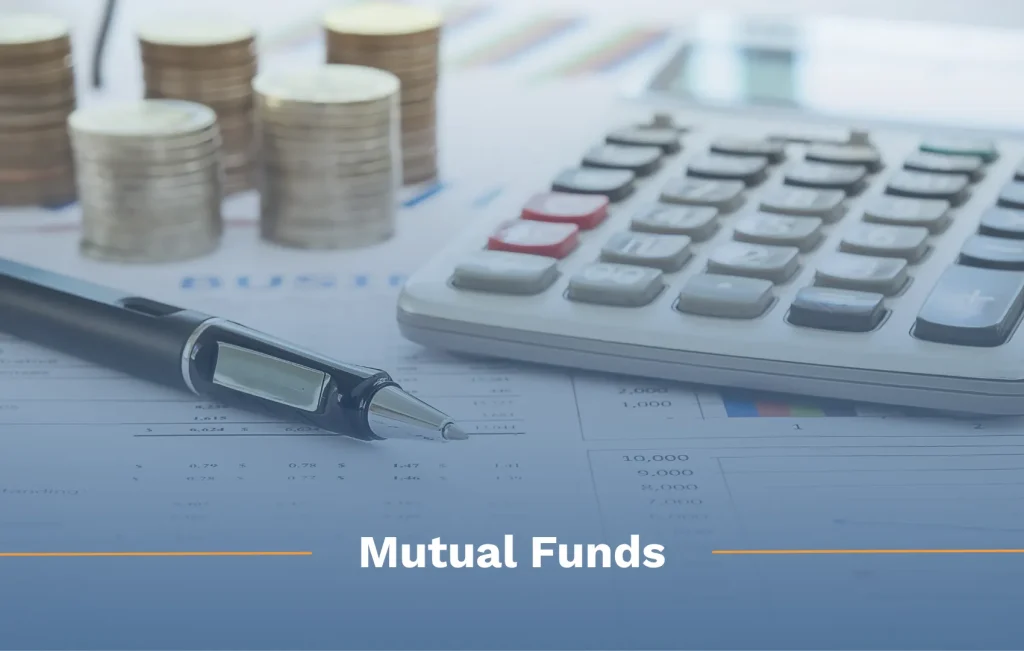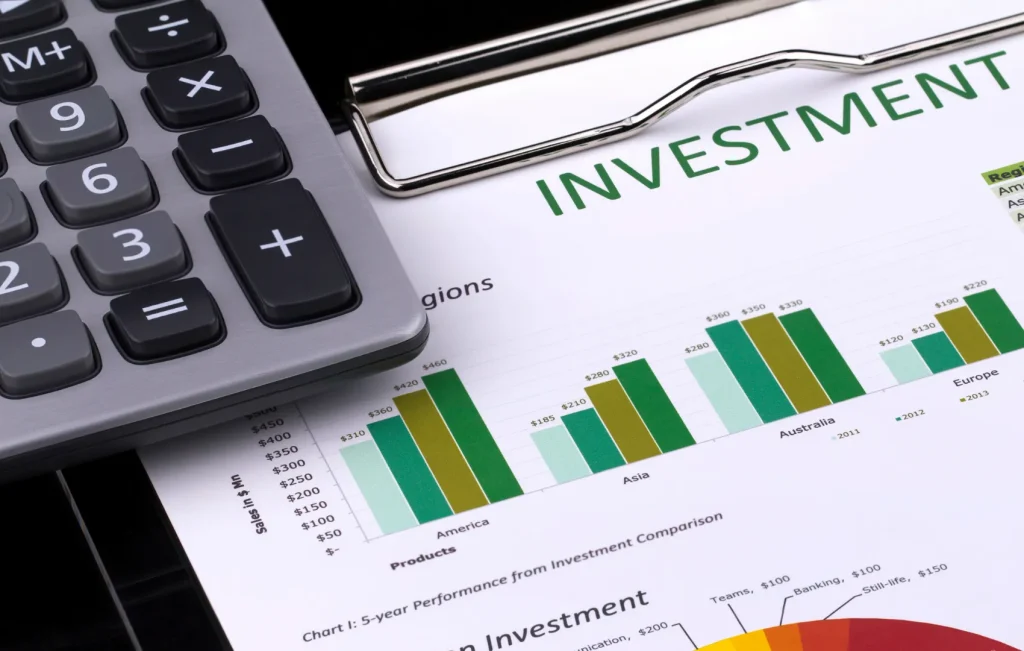Choosing between mutual funds vs ETFs should be based on your goals, budget, flexibility, and risk tolerance. Both investment choices offer diversification, but they differ in terms of structure, trading, and tax implications.
This article compares mutual funds and ETFs, providing a clearer understanding of these investments to inform your decision-making based on your specific needs and preferences.
What is a Mutual Fund?

A mutual fund is an investment that pools money from investors to buy a diversified portfolio of securities, including stocks, bonds, and money market instruments. In a mutual fund, portfolios are managed by professionals, and investors purchase or sell shares of the fund directly at the end-of-day net asset value (NAV).
Mutual funds are managed either actively or passively.
In an actively managed fund, securities are bought or sold to outperform a specific benchmark, such as the S&P 500.
In a passively managed fund, managers track a specific market index with the goal of replicating its performance with minimal trading activity.
Mutual funds are a staple in IRAs, 401(k), and other tax-advantaged retirement accounts. Employers frequently include mutual funds as part of their retirement plans, making them available to employees.
Mutual funds are especially popular for long-term goals, including retirement savings, education, and wealth growth, due to their ability to withstand market volatility.
Pros and Cons of Mutual Funds
Pros of Mutual Funds
Mutual funds offer several benefits, including professional management, diversification, and long-term growth potential.
The diversification option enables investors to spread their investments across a broad range of choices, lowering the risk associated with holding a single investment option. Professional management handles portfolio, conducting research, and making informed decisions based on your goals.
Mutual funds are also widely available, often included as the default option in employer-sponsored retirement plans, such as 401(k)s or IRAs, making them an ideal choice for long-term savings.
Cons of Mutual Funds
Mutual funds, however, come with higher management fees, particularly for the actively managed options.
They are also priced and exchanged only at specific times of day, once per day at the net asset value (NAV), which prevents active traders who require instant liquidity from capitalizing during market volatility.
Mutual funds are less tax-efficient than ETFs because they can distribute taxable capital gains even if investors do not sell their shares.
For example, an actively managed fund engages in regular trading (buying and selling) to outperform the market. Capital gains are accrued on all securities sold for a profit. These taxable gains are then distributed to investors.
What Is an ETF (Exchange-Traded Fund)?

An ETF, or Exchange-Traded Fund, is a type of pooled investment fund that trades on a stock exchange, much like individual stocks, comprising a collection of assets such as stocks, bonds, and securities. Investors purchase shares of the pool of investments that the ETF holds and receive profits from the trade based on the number of ETF shares they own.
While most ETFs are passively managed, following an index (such as the S&P 500) to replicate performance, they can also be actively managed by selecting securities that outperform a benchmark.
Unlike mutual funds, ETFs are traded throughout the trading day, typically from 9:30 a.m. to 4:00 p.m. ET, and their prices fluctuate in real-time.
Pros and Cons of ETFs
Pros of ETFs
ETFs are gaining popularity among individual and institutional investors for a variety of reasons, including lower expense ratios, no minimum investment requirements, intraday trading flexibility, and tax efficiency.
The expense ratio, which represents the annual costs paid to the fund for management and operations, is typically lower with ETFs than with mutual funds. This is especially true for passively managed ETFs, which track an index rather than making active purchasing and selling choices.
Furthermore, ETFs have no minimum investment requirement, making them accessible to individuals with minimal funds.
ETFs are also traded similarly to individual stocks but with longer market hours than mutual funds, which are traded once a day.
Finally, mutual funds vs ETFs differ in terms of tax efficiency. ETFs are designed to minimize tax bills in taxable accounts. The “in-kind” redemption method entails exchanging securities between the fund and its brokers without selling assets, hence avoiding taxable capital gains distributions. Investors will owe taxes on capital gains when they sell their investments.
Cons of ETFs
Just like mutual funds, ETFs have some downsides.
The first con is that investors may be required to pay transaction costs, which vary depending on the brokerage. For example, investors may pay a brokerage commission for each trade. This differs from mutual funds, which are frequently purchased straight from the fund company without commissions.
Second, most ETFs are passively managed. This means that ETFs lack an active manager who tailors investments to specific aims or market conditions, making them a less personalized management option compared to mutual funds.
Third, ETFs pose a higher risk of overtrading. The nature of ETFs, which trade throughout the day, may attract investors to trade too frequently, possibly leading to higher expenses and suboptimal results.
Mutual Funds vs ETFs
| Feature | Mutual Funds | ETFs |
| Pricing | End-of-day NAV | Real-time market pricing |
| Management Style | Often actively managed | Often passively managed |
| Fees | Higher (1% or more is common) | Lower (especially for index ETFs) |
| Minimum Investment | Typically $500-$3,000 | None (just cost of one share) |
| Trading Flexibility | No intraday trading | Can trade any time the market is open |
| Tax Efficiency | Less efficient due to turnover | More tax-efficient via in-kind transfers |
Which Investment Is Right for You?

Your Investment Goals
The first factor in deciding whether to invest in mutual funds vs ETFs is to consider your financial goals.
If your goal is long-term growth, where the focus is on building wealth over many years, you want an investment that provides steady returns and minimizes costs.
In this case, both investments can be ideal. For example, a mutual fund may be the ideal option for a long-term retirement account due to its diversified portfolio and professional management. They also offer suitable features, such as automatic investment plans that pay out contributions on a regular basis.
For a taxable account, ETFs are the better option, as they offer lower fees and tax efficiency.
When it comes to short-term flexibility, such as those with active portfolio management, where quick trades and the ability to access funds are crucial, ETFs are a better option. They offer intraday trading, as opposed to mutual funds, which have a limited trading period (once a day at the NAV).
Your Risk Tolerance
Risk tolerance is another crucial factor to consider when looking at mutual funds vs ETFs.
A low risk tolerance means preferring stable investments, often prioritizing capital over high returns. On the contrary, a high-risk tolerance is being comfortable with significant potential losses for the chance of higher returns.
For low-risk investors, mutual funds such as bond funds or target-date funds, as well as bond ETFs or broad-market ETFs, are ideal for those seeking stability. For high-risk investors, actively managed equity funds, sector-specific funds, and ETFs carry high volatility but high growth potential.
Your Time Commitment
The amount of time you can dedicate to your investment should be a top priority when deciding where to invest. Successfully managing investment takes a lot of time and effort.
If you require a hands-off investment approach, professional management, such as actively managed mutual funds, would be the ideal choice. On the other hand, ETFs, which have a higher time commitment, are a better option for investors who prefer real-time trading and diverse strategies.
Fees and Tax Sensitivity
How important are low costs and tax efficiency to you? And is your portfolio inside a tax-advantaged account?
If minimizing costs and achieving high tax efficiency are top priorities, ETFs are a better option. They offer lower costs, including lower expense ratios and fewer capital gains distributions, which are taxable in a mutual fund investment.
However, if your portfolio is inside a tax-advantaged account, mutual funds are preferred since they are often found in employer-sponsored plans (unlike ETFs), offer automatic investment options, and benefit from professional management.
In this case, tax inefficiency (e.g., capital gains distributions) is irrelevant since taxes are deferred until withdrawal.
How Butson Financial Advisors, LLC Can Help
Deciding on mutual funds vs ETFs can be challenging, given the intricacies that come with these types of investment instruments. This is where help from financial professionals, such as Butson Financial Advisors, LLC, comes in handy.
When you opt for a team of advisors, you work with professionals who understand what these investment options entail and how to choose them correctly based on your preferences and goals. Contact our advisors today to get started!

